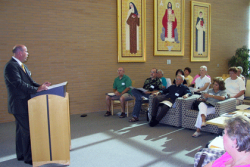24 heed call to be 'Co-workers in the Vineyard'

SALT LAKE CITY - "The harvest is abundant, but the laborers are few." — Matthew 9:37 With baptism, Catholics are called to answer Jesus’ command to pick up their cross and follow him. In the Diocese of Salt Lake City, 24 people from all walks of life responded by completing a four-year lay ecclesial ministry formation program that will culminate with a public blessing by Bishop John C. Wester during a Mass on Jan. 30 at the Cathedral of the Madeleine. "It’s the first time ever for the laity to have the public recognition in that particular setting," said Susan Northway, director of the diocese’s Office of Religious Education, who oversaw the program. "This group, they’re pioneers." Those who complete the program can serve in a variety of leadership positions within the Church such as directors of religious education or as RICA directors. The term "lay ecclesial ministry" was coined by the United States Council of Catholic Bishops (USCCB) to describe the lay men and women who have taken a variety of leadership positions in Church ministry. In the 2005 document "Co-workers in the Vineyard of the Lord," the USCCB provided a resource for dioceses that are developing programs for this ministry. "The call to lay ecclesial ministry is an authentic beckoning of Christ to deeper service on behalf of the Church," Northway said. For Marcy Thaeler, the program was a way to further her educational, experiential and spiritual growth, she said. She was training to become a hospital chaplain, but with the lay ecclesial ministry program, she will go on to complete a master’s degree at the Aquinas Institute of Theology and then plans to become certified as a Catholic chaplain. Tony Hanebrink and his wife, Diana, also will complete the program in January. "Because Diana and I have taken this journey together, our relationship is stronger, and we have much to talk about," Hanebrink said in an email interview. "I have grown considerably in my understanding of the teachings of my faith. Spending five to 10 hours per week in these studies helped me focus on God, doctrine and spiritual principles during the other hours of the week." The Hanebrinks plan to participate in their parish’s marriage preparation as their lay ecclesial ministry, and Hanebrink said he will support his wife, who leads their parish’s RCIA program. "We will continue with Bible study," he said. "My hope for myself is that I can keep more of my focus on my relationship with God. Shalom means peace - right relationship with God, self and others - and that is what I long for in my life." The Diocese of Salt Lake City’s lay ecclesial ministry formation program is comprised of four intertwining categories: theological, spiritual, human formation and pastoral formation. These four areas are the same as those for priests and deacons, although the lay ecclesial ministers formation is different, Northway said. The theological component was through the University of Notre Dame’s online Satellite Theological Education Program (STEP). Interacting weekly with Catholics from all over the world through the online program "has been great," Thaeler said. "The instructors for these STEP classes have been excellent, some of the best known theologians in the country." Spiritual formation included daily prayer and participation in the sacraments; and human formation had such topics as communication, conflict resolution and time management. The pastoral portion was supervised work in parish and other settings. Some of those who completed the program through the Salt Lake diocese will be certified through the National Association of Lay Ministers. Six of the group, including Thaeler, have already started formal master’s level programs.
© Copyright 2025 The Diocese of Salt Lake City. All rights reserved.

Stay Connected With Us